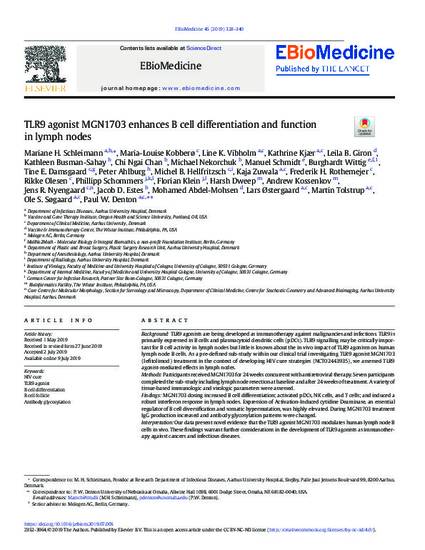
Background
TLR9 agonists are being developed as immunotherapy against malignancies and infections. TLR9 is primarily expressed in B cells and plasmacytoid dendritic cells (pDCs). TLR9 signalling may be critically important for B cell activity in lymph nodes but little is known about the in vivo impact of TLR9 agonism on human lymph node B cells. As a pre-defined sub-study within our clinical trial investigating TLR9 agonist MGN1703 (lefitolimod) treatment in the context of developing HIV cure strategies (NCT02443935), we assessed TLR9 agonist-mediated effects in lymph nodes. Methods
Participants received MGN1703 for 24 weeks concurrent with antiretroviral therapy. Seven participants completed the sub-study including lymph node resection at baseline and after 24 weeks of treatment. A variety of tissue-based immunologic and virologic parameters were assessed. Findings
MGN1703 dosing increased B cell differentiation; activated pDCs, NK cells, and T cells; and induced a robust interferon response in lymph nodes. Expression of Activation-Induced cytidine Deaminase, an essential regulator of B cell diversification and somatic hypermutation, was highly elevated. During MGN1703 treatment IgG production increased and antibody glycosylation patterns were changed. Interpretation
Our data present novel evidence that the TLR9 agonist MGN1703 modulates human lymph node B cells in vivo. These findings warrant further considerations in the development of TLR9 agonists as immunotherapy against cancers and infectious diseases. Fund
This work was supported by Aarhus University Research Foundation, the Danish Council for Independent Research and the NovoNordisk Foundation. Mologen AG provided study drug free of charge.
Available at: http://works.bepress.com/paul-denton/9/

https://doi.org/10.1016/j.ebiom.2019.07.005